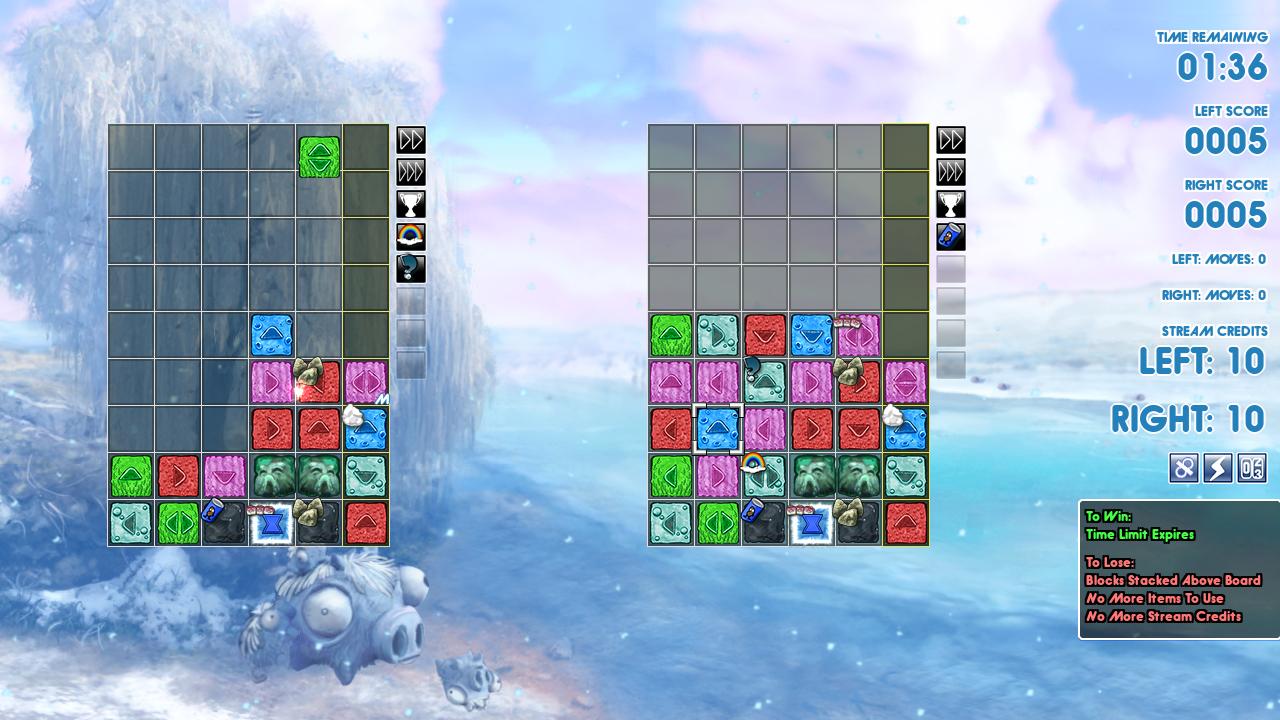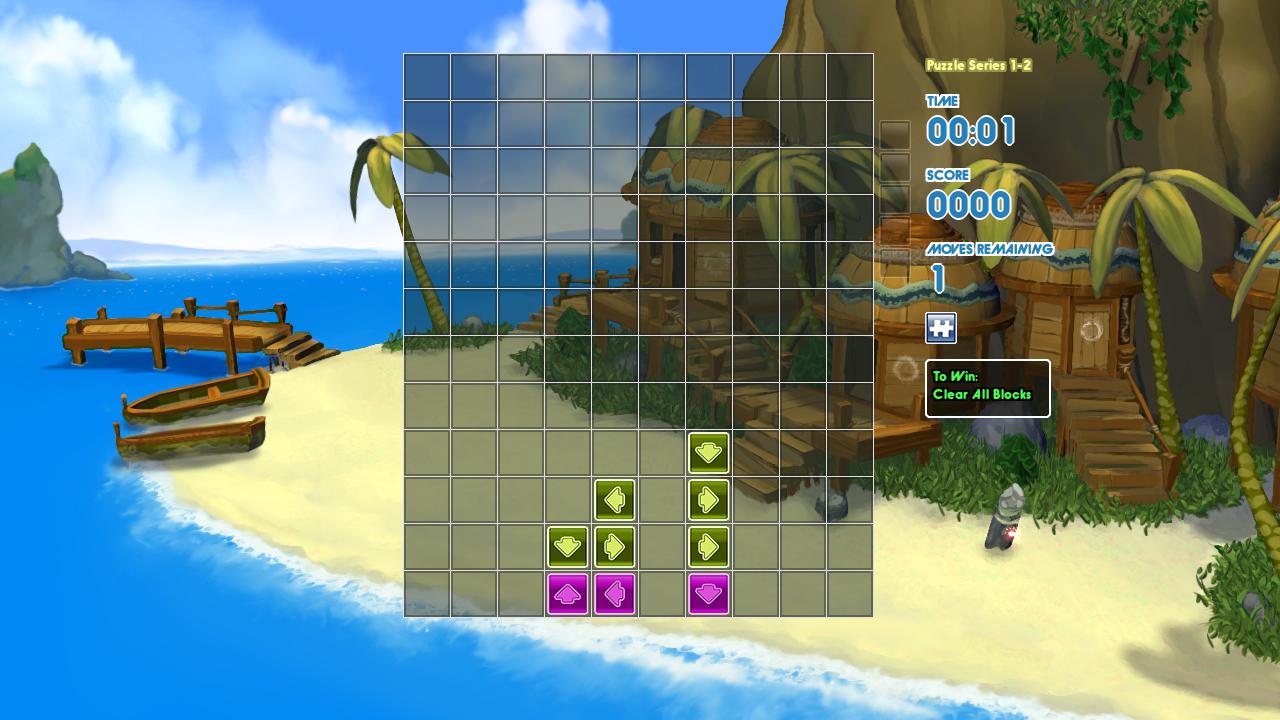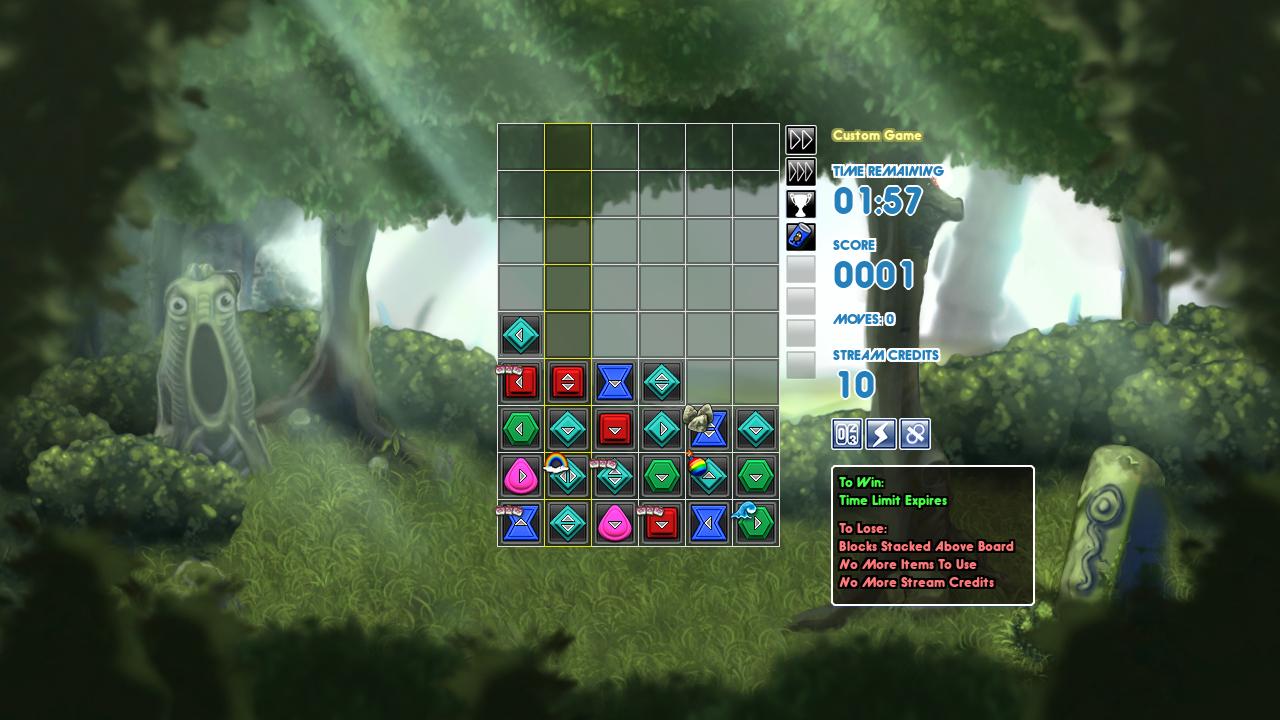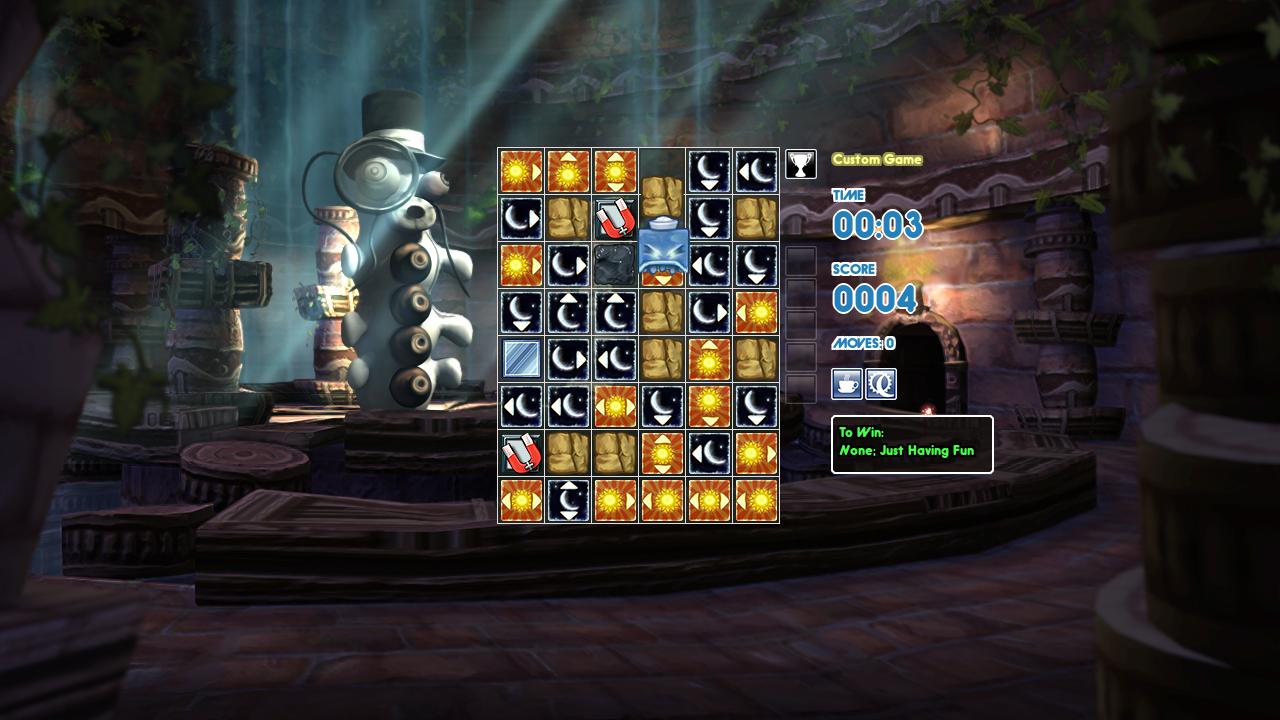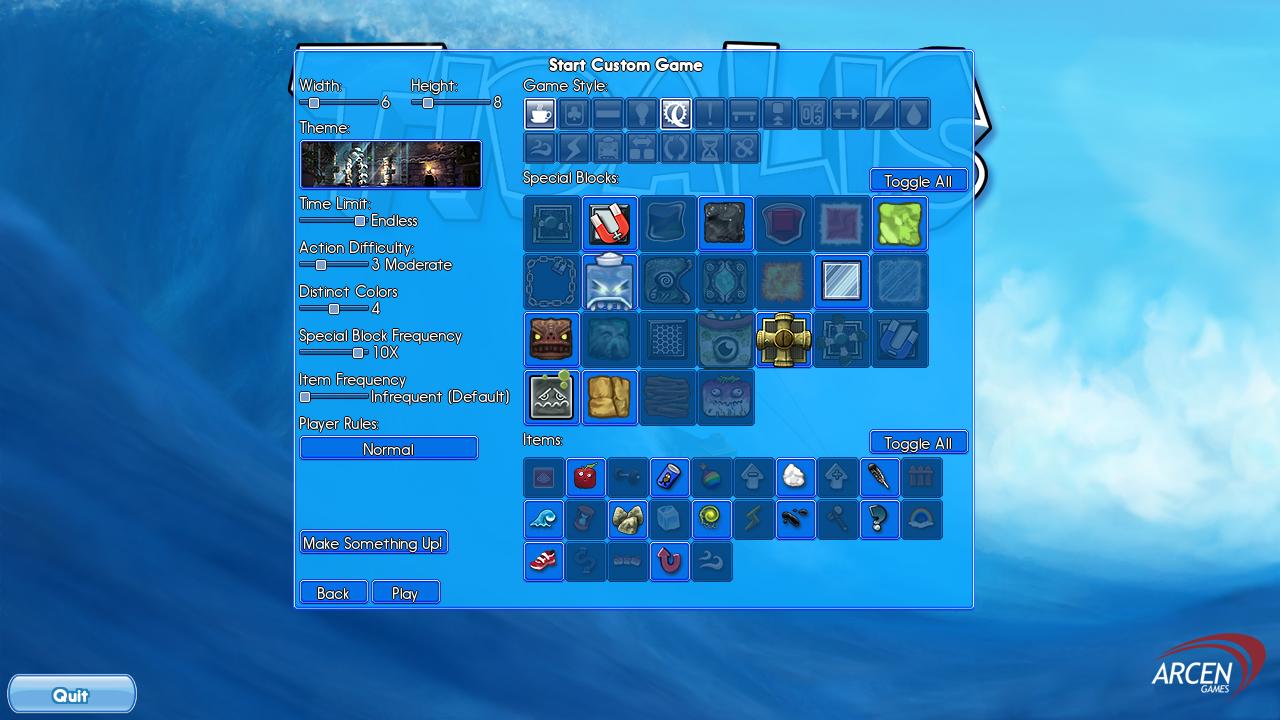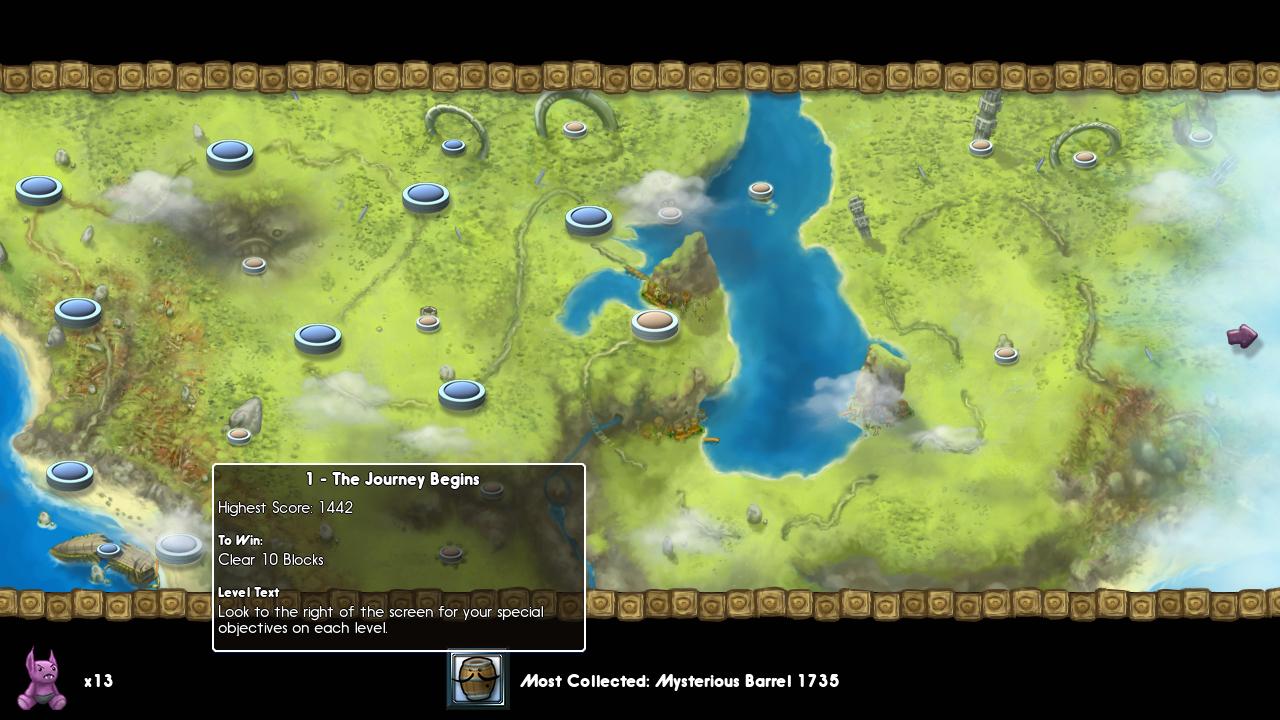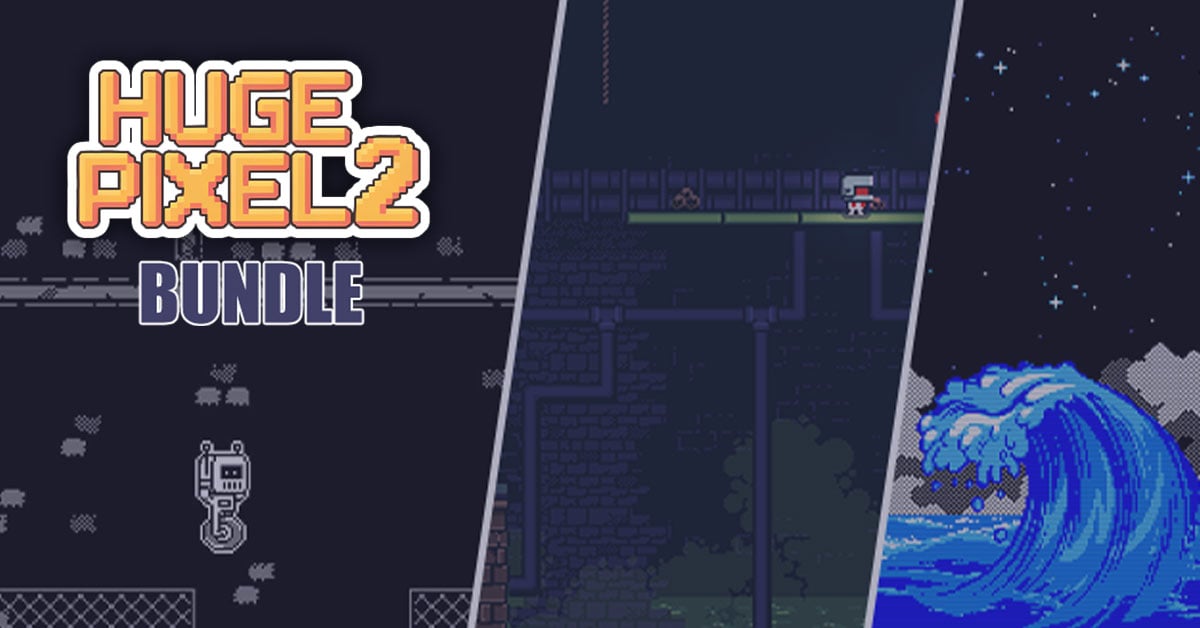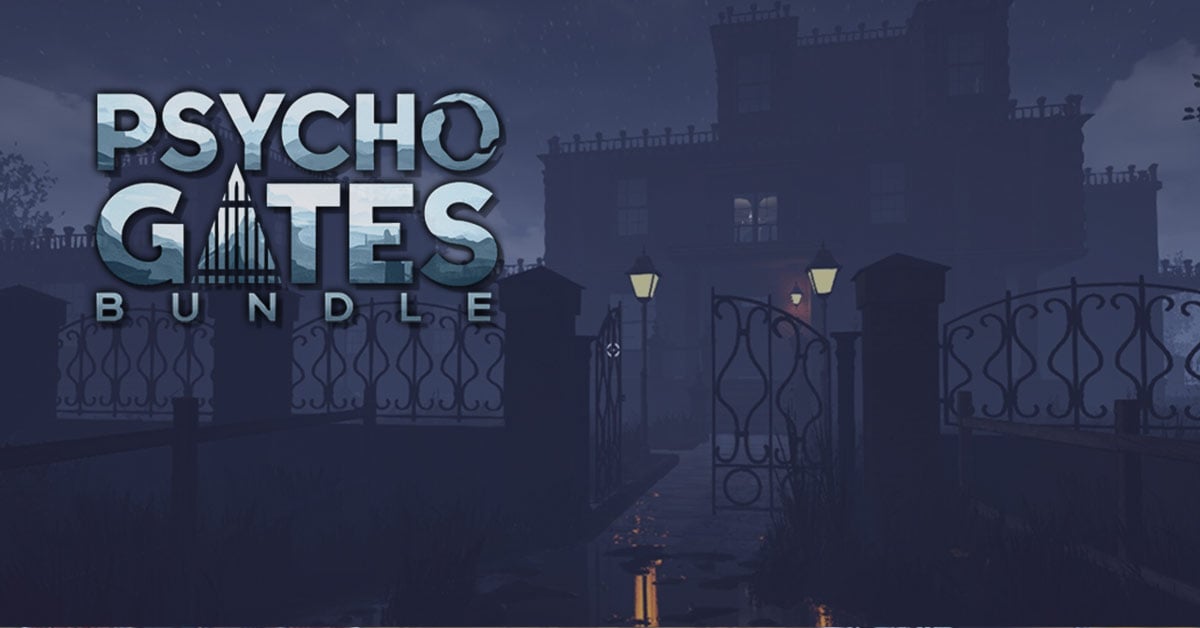Tidalis is a block-based puzzle game with casual appeal, hardcore depth, and an addictive new "streams" mechanic. The game is brimming over with riffs and variants on that core mechanic with 20 game modes, dozens of special blocks and items, and 115 levels in the adventure mode alone. The basic rules of the game are this: blocks fall down into the board and have a color and an arrow direction. If a stack of blocks exceeds the height of the board, you lose. In order to clear blocks, you must right-click and drag paths through the arrows to set up chain reactions of like-colored blocks.
If this sounds simple, that's because it is -- you'll be lining up lengthy chains within minutes. But you'll be surprised how much brainpower it takes to set up combos of multiple chains, and the many brainteaser-style puzzles include some real stumpers. Tidalis has co-op and competitive multiplayer modes (both online and offline); action-oriented modes and timer-less brainteasers; a lengthy, casual-friendly adventure mode; twenty unique game modes providing innumerable twists to the basic gameplay; dozens of special blocks and items; and over fifty minutes of beautiful music to go with the painterly art.
In short, several games' worth of content are built on top of this core mechanic, which you'll quickly find to be as iconic as it is novel.
If this sounds simple, that's because it is -- you'll be lining up lengthy chains within minutes. But you'll be surprised how much brainpower it takes to set up combos of multiple chains, and the many brainteaser-style puzzles include some real stumpers. Tidalis has co-op and competitive multiplayer modes (both online and offline); action-oriented modes and timer-less brainteasers; a lengthy, casual-friendly adventure mode; twenty unique game modes providing innumerable twists to the basic gameplay; dozens of special blocks and items; and over fifty minutes of beautiful music to go with the painterly art.
In short, several games' worth of content are built on top of this core mechanic, which you'll quickly find to be as iconic as it is novel.
Key Features:
- Puzzle game with casual appeal, hardcore depth, and an addictive new mechanic.
- Two-player co-op and competitive play (both local and networked).
- A wide selection of both action-oriented or brainteaser-like levels.
- Casual-friendly adventure mode, hardcore-focused custom games and vs modes.
- 20+ game styles, and dozens of items and special blocks.
- Rich, painterly art style and beautiful music.
- Players can create and share whole new themes, levels, and adventures.
- Options for colorblind players, players averse to lots of light and motion, and older computers.
AI War 2 has left early access!
The fact that this game exists isn't a testament to me having some brilliant insight or a singular vision that I doggedly pursued. The reviews of the game are lovely, but give me entirely too much personal credit.
The state of this game is thanks to dozens of people critically thinking about this game -- what this one and the original means to them and to others -- and then a process of relentless, continuous, arduous iteration and improvement.
Badger has been involved since the kickstarter, with questions and comments and key insights. For a lot of the first year, he was responsible for something like 80% of the bug reports and feature ideas on our idea tracker . When a lot of other people were just bouncing off the game and waiting around for Keith LaMothe and I to figure things out on our own -- understandable, really -- Badger was there providing really key insight and ideas.
But that was barely the start for him. After a while I was essentially like "so, do you just want source code access, given how much you're doing here?" Because he had started doing some mods -- nanocaust and macrophage, at the time, IIRC -- and it was clear he would be less hand-tied if he had more access.
What happened next was essentially us getting a developer -- volunteer, no less -- who contributed as much to the design of the game as I did, in my opinion. Not only did he single-handedly conceive of and implement the nanocaust and macrophage, but he also did the dark spire and marauder impelementations, among many, many other things.
Some of the most brilliant and devious things that the AI has in this game compared to the first one? Badger. Some of your favorite UI detail screens, like metal flows? Badger.
Not to mention all the bugfixes, balance tweaks, and... just oodles more. This game wouldn't exist in anything like the state it does now without Badger. Any credit for my "singular vision" on the game is doing him a major disservice, but he's a quiet sort of guy when it comes to taking credit, so I wanted to take this chance to call him out in particular.
RocketAssistedPuffin has also been involved heavily for the last year plus, and has taken over huge numbers of things that I never would have had time for. After I implemented the new tech system one way, he's the one who figured out how to make it substantially more balanced. Most of the voluminous "balance change" sections on the release notes are from him working with other players or just reasoning things out himself.
Puffin has also had a ton of ideas on how to make things better in all sorts of sections of the game, and there was a period of about three months late last year where he and Badger were basically doing ALL the development on the game and I just pushed out releases of what they were doing. I was going through a really painful divorce and had a ton of anxiety and couldn't face work, and these two kept things alive and improving.
But it never stopped there. Those new tutorials you like? Puffin. I wrote the bulk of the "How To Play" in-game wiki sections, but the most basic and understandable ones for new players were... again, Puffin. I'm excellent at writing encyclopedic entries that fill you in on huge numbers of details, but he's the one who distilled "what's the most central stuff you need to know, as briefly as possible" so that people can actually get into the game in any reasonable timeframe. Compare his work here to the tutorials I did in the original game, and it's night and day.
And I'm still selling Puffin short, frankly, because he's done so many things over such a long period that I can't remember it all now.
More recently, we've had folks like WeaponMaster and Asteroid joining in and adding lots of bugfixes and quality of life improvements that I never would have had the time to do myself. Things like hovering over galaxy map links to see information on them were Asteroid. Endless tricky bugfixes were WeaponMaster. I'm selling them both short, but the release notes are filled with things that they either implemented or suggested or both.
And it doesn't stop there. Quinn stepped in an made a bunch of additions. Keith laid the original groundwork for the entire game simulation and multithreading (he was the main programmer and designer for the first year and a half, and actually on staff during that time).
And there were so, so many others. And more each month!
So a lot of the folks that have turned into volunteers are what would have been modders on most other games. They would have made their own thing that you had to install and then wonder about the cross-compatibility of.
This game does have a ton of moddability, and for anyone who wants to "just" be a modder, that's absolutely fine with me. But for a lot of the mods that are getting the most love, I'm happy to share source code access with those folks so that they're in no way hobbled, and so that their work can go out as additional content that every player can find via in-game options without having to hunt through Steam Workshop or whatever else.
It's an unorthodox approach, but a lot more team-oriented and lets us do quality control on each others' stuff, "mods" included, which is a big win. If someone wants to steal the source code for this game, they can just decompile it like any other game for the most part. I'd rather put my trust in people and see things flourish rather than retain a stranglehold out of fear or pride.
I got to build lots of mechanics that other people then actually turned into specific units. It also gave me time to focus on some really nagging problems that just made the early versions of the game... unpleasant.
If I hadn't had the time to think and talk to people about all those things, we never would have seen all the game evolve this way; I would have been mired in content development and other items just to get the basics out for the game.
The original design for this was something that Keith and I put together as a pair, but it only worked out so well. It was a good foundation, but needed... a lot of help. We both pushed that forward a lot, until the money situation got to the point where he (and all the other staff, eventually) had to step away, and I carried on "alone" (but with all those volunteers).
There came a couple of major turning points where I was reflecting on why I was so unhappy with this game as it existed, and listening to the various gripes that playtesters had, and then I was able to spend a month or three implementing something drastically new.
Fleets are the most notable of those, and they were initially met with a lot of mixed feelings and distaste because only part of my idea was there on the first public launch of those. Only in the last month or so has that feature completely come into its own, and that also had a lot to do with continuous feedback from people in early access telling me what they needed and what they did and didn't like.
We also had a number of points during development where we just couldn't escape certain performance problems, because there were suddenly battles that were an order of magnitude larger than the first game (which was itself the largest strategy game simulation of individual units that I'm aware of on the market until this sequel). So I got to focus on a whole bunch of crazy improvements and data structure inventions and even GPU shader tricks in order to make all this stuff work.
Without the rest of the community helping, there's no way I could have had time to work on all that sort of thing, even in three years of development. A game of this scope shouldn't run this well -- it shouldn't be possible -- but it is because I was given the gift of time by so many others.
We didn't do any work on any AI War games from late 2014 through late 2016, but the rest of that time has been spent at least partly working on the original game or this sequel.
From version 5.0 of the original game through version 8.0, Keith was pretty much the sole developer on that while I focused on other things. He built out a ton of creative and clever things that made a return in this game, and also pushed the concept of what the AI could be -- adding in some traditional decision-tree style logic in places in addition to the more decentralized-style AI that I had come up with back in 2009. That one that originally made waves on slashdot and reddit and hackernews and so on .
I've worked as the producer and design lead on this sequel, among my many other roles, and so the fact that there seems to be a "singular vision" is hopefully a sign that I did a good job in that role. But the degree to which this is a product of dozens of people's work, over an extremely long period of time, really can't be understated.
That's what I meant all the way back at the start. This sort of thing shouldn't have happened. It's just so... unlikely. A ton of people came together over a decade and helped make something unlike anything else on the market.
That's before even getting into other major (former) staff contributors like Daniette "Blue" Shinkle doing the vast majority of the art and coming up with the way-prettier style of ship that evolved AFTER the kickstarter, the awesome score by Pablo Vega, and 25 voice actors who did a fantastic job as various humans and the AI.
And good grief, I'd be remiss not to mention Erik and Craig and all the other folks at Indie Bros , who helped manage so many aspects of this game, as well as often doing work like helping clean up voice lines, etc.
Similar if you want to know what the plan is for multiplayer .
For kickstarter backers (or anyone else who is curious), there's an FAQ as well as roadmap of stuff for the next few quarters relating to kickstarter stretch goals .
And I just have to once-again plug this awesome After Action Report by zeusalmighty .
Thanks to all of the kickstarter backers for believing that we even COULD build this game. Keith and I felt like we could do something that would make you happy, but probably not something that would top the original. It took two extra years of development and an enormous village of people to make THAT a reality. So thanks to everyone for their patience and support during that time.
I also want to say a big thanks to everyone for their understanding during my divorce , which happened shortly after entering Early Access for this game. That made everything so much harder, and took me out of commission for a full three months or so where I just couldn't work much. I had to learn how to be me again, and come to terms with being a dad with shared custody rather than a full-time father, and all of that was incredibly hard.
But the good news is that, as has happened with this game itself, a lot of things in my personal life have turned out unexpectedly, improbably well in the last year. After deciding to date again (after 18 years off the market, wow), I wound up meeting the woman who is now my fiance surprisingly quickly (all things considered). Kara and her daughter have made my entire world so much richer than I realized it could be , and my son finally has the sister he's wanted for so much of his life.
I feel incredibly fortunate, and a lot of my ability to get back to work and not crumble under the weight of anxiety and expectations for this game were thanks to Kara's support and presence. The reality of her life as a doctor and surgeon also helps to kind of put my own work into perspective, sometimes, in the best way.
However this turns out financially, and despite my anxieties about my future as a game developer, I'm incredibly proud of what we've all created together, and I feel surrounded by all the right people both at work and outside of work. This has been the hardest three year period of my life, but the end result has all been worth it.
Thanks to everyone, and I hope you enjoy the game -- both what it is now, and what's to come.
Very Best,
Chris
Chris here! By any sane metric I can think of, AI War 2 shouldn't exist. And yet it's more than I ever imagined it could be.
When we first set out to make this game three years ago, it was far less ambitious. Even that was going to be really hard. Somehow, in the process of falling down the stairs over and over again during this period, we wound up with a game that seems to be superior to the original.
This game shouldn't exist, but it does, and I'm both proud and stunned.
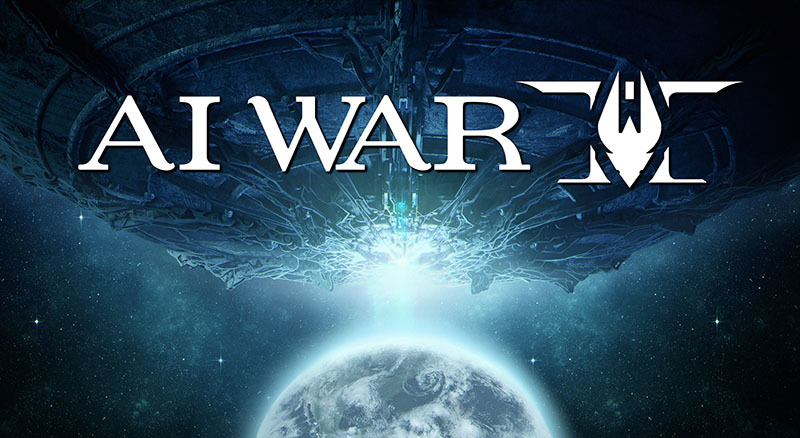
The Secret? Community
The intro to this post runs the risk of sounding like I'm tooting my own horn, but it's not actually about me. I'm not capable of making -- even just designing -- this game on my own. I don't think anyone is, really.The fact that this game exists isn't a testament to me having some brilliant insight or a singular vision that I doggedly pursued. The reviews of the game are lovely, but give me entirely too much personal credit.
The state of this game is thanks to dozens of people critically thinking about this game -- what this one and the original means to them and to others -- and then a process of relentless, continuous, arduous iteration and improvement.
MVP Award: BadgerBadger
This section is long, and in some ways tangential, but if you read it you'll understand why I've put it here so prominently. You have this guy to thank as much as me or Keith for this game existing.Badger has been involved since the kickstarter, with questions and comments and key insights. For a lot of the first year, he was responsible for something like 80% of the bug reports and feature ideas on our idea tracker . When a lot of other people were just bouncing off the game and waiting around for Keith LaMothe and I to figure things out on our own -- understandable, really -- Badger was there providing really key insight and ideas.
But that was barely the start for him. After a while I was essentially like "so, do you just want source code access, given how much you're doing here?" Because he had started doing some mods -- nanocaust and macrophage, at the time, IIRC -- and it was clear he would be less hand-tied if he had more access.
What happened next was essentially us getting a developer -- volunteer, no less -- who contributed as much to the design of the game as I did, in my opinion. Not only did he single-handedly conceive of and implement the nanocaust and macrophage, but he also did the dark spire and marauder impelementations, among many, many other things.
Some of the most brilliant and devious things that the AI has in this game compared to the first one? Badger. Some of your favorite UI detail screens, like metal flows? Badger.
Not to mention all the bugfixes, balance tweaks, and... just oodles more. This game wouldn't exist in anything like the state it does now without Badger. Any credit for my "singular vision" on the game is doing him a major disservice, but he's a quiet sort of guy when it comes to taking credit, so I wanted to take this chance to call him out in particular.
Growing Volunteer Developer Corps
So, Badger is not remotely the only person I need to call out as being absolutely indispensable.RocketAssistedPuffin has also been involved heavily for the last year plus, and has taken over huge numbers of things that I never would have had time for. After I implemented the new tech system one way, he's the one who figured out how to make it substantially more balanced. Most of the voluminous "balance change" sections on the release notes are from him working with other players or just reasoning things out himself.
Puffin has also had a ton of ideas on how to make things better in all sorts of sections of the game, and there was a period of about three months late last year where he and Badger were basically doing ALL the development on the game and I just pushed out releases of what they were doing. I was going through a really painful divorce and had a ton of anxiety and couldn't face work, and these two kept things alive and improving.
But it never stopped there. Those new tutorials you like? Puffin. I wrote the bulk of the "How To Play" in-game wiki sections, but the most basic and understandable ones for new players were... again, Puffin. I'm excellent at writing encyclopedic entries that fill you in on huge numbers of details, but he's the one who distilled "what's the most central stuff you need to know, as briefly as possible" so that people can actually get into the game in any reasonable timeframe. Compare his work here to the tutorials I did in the original game, and it's night and day.
And I'm still selling Puffin short, frankly, because he's done so many things over such a long period that I can't remember it all now.
More recently, we've had folks like WeaponMaster and Asteroid joining in and adding lots of bugfixes and quality of life improvements that I never would have had the time to do myself. Things like hovering over galaxy map links to see information on them were Asteroid. Endless tricky bugfixes were WeaponMaster. I'm selling them both short, but the release notes are filled with things that they either implemented or suggested or both.
And it doesn't stop there. Quinn stepped in an made a bunch of additions. Keith laid the original groundwork for the entire game simulation and multithreading (he was the main programmer and designer for the first year and a half, and actually on staff during that time).
And there were so, so many others. And more each month!
Volunteers Beat Modders, I Think
I'm pretty free with the source code access, because I'd rather have a consolidated community of people helping rather than a bunch of mods that you have to hunt down and find.So a lot of the folks that have turned into volunteers are what would have been modders on most other games. They would have made their own thing that you had to install and then wonder about the cross-compatibility of.
This game does have a ton of moddability, and for anyone who wants to "just" be a modder, that's absolutely fine with me. But for a lot of the mods that are getting the most love, I'm happy to share source code access with those folks so that they're in no way hobbled, and so that their work can go out as additional content that every player can find via in-game options without having to hunt through Steam Workshop or whatever else.
It's an unorthodox approach, but a lot more team-oriented and lets us do quality control on each others' stuff, "mods" included, which is a big win. If someone wants to steal the source code for this game, they can just decompile it like any other game for the most part. I'd rather put my trust in people and see things flourish rather than retain a stranglehold out of fear or pride.
What Did I Actually Do, Then?
All of this help from others let me focus on some of the really tricky architectural and design problems, which led to things like us even being able to HAVE a simulation of this size, and to have it perform as smoothly as it does.I got to build lots of mechanics that other people then actually turned into specific units. It also gave me time to focus on some really nagging problems that just made the early versions of the game... unpleasant.
If I hadn't had the time to think and talk to people about all those things, we never would have seen all the game evolve this way; I would have been mired in content development and other items just to get the basics out for the game.
The original design for this was something that Keith and I put together as a pair, but it only worked out so well. It was a good foundation, but needed... a lot of help. We both pushed that forward a lot, until the money situation got to the point where he (and all the other staff, eventually) had to step away, and I carried on "alone" (but with all those volunteers).
There came a couple of major turning points where I was reflecting on why I was so unhappy with this game as it existed, and listening to the various gripes that playtesters had, and then I was able to spend a month or three implementing something drastically new.
Fleets are the most notable of those, and they were initially met with a lot of mixed feelings and distaste because only part of my idea was there on the first public launch of those. Only in the last month or so has that feature completely come into its own, and that also had a lot to do with continuous feedback from people in early access telling me what they needed and what they did and didn't like.
We also had a number of points during development where we just couldn't escape certain performance problems, because there were suddenly battles that were an order of magnitude larger than the first game (which was itself the largest strategy game simulation of individual units that I'm aware of on the market until this sequel). So I got to focus on a whole bunch of crazy improvements and data structure inventions and even GPU shader tricks in order to make all this stuff work.
Without the rest of the community helping, there's no way I could have had time to work on all that sort of thing, even in three years of development. A game of this scope shouldn't run this well -- it shouldn't be possible -- but it is because I was given the gift of time by so many others.
A Decade In The Making
It has been 10 years to the day since the first AI War came to Steam, and it's been 3 years of developing this sequel.We didn't do any work on any AI War games from late 2014 through late 2016, but the rest of that time has been spent at least partly working on the original game or this sequel.
From version 5.0 of the original game through version 8.0, Keith was pretty much the sole developer on that while I focused on other things. He built out a ton of creative and clever things that made a return in this game, and also pushed the concept of what the AI could be -- adding in some traditional decision-tree style logic in places in addition to the more decentralized-style AI that I had come up with back in 2009. That one that originally made waves on slashdot and reddit and hackernews and so on .
I've worked as the producer and design lead on this sequel, among my many other roles, and so the fact that there seems to be a "singular vision" is hopefully a sign that I did a good job in that role. But the degree to which this is a product of dozens of people's work, over an extremely long period of time, really can't be understated.
That's what I meant all the way back at the start. This sort of thing shouldn't have happened. It's just so... unlikely. A ton of people came together over a decade and helped make something unlike anything else on the market.
That's before even getting into other major (former) staff contributors like Daniette "Blue" Shinkle doing the vast majority of the art and coming up with the way-prettier style of ship that evolved AFTER the kickstarter, the awesome score by Pablo Vega, and 25 voice actors who did a fantastic job as various humans and the AI.
And good grief, I'd be remiss not to mention Erik and Craig and all the other folks at Indie Bros , who helped manage so many aspects of this game, as well as often doing work like helping clean up voice lines, etc.
A Few Common Questions
If you're interested in what is coming in the very short term , there's a post for that.Similar if you want to know what the plan is for multiplayer .
For kickstarter backers (or anyone else who is curious), there's an FAQ as well as roadmap of stuff for the next few quarters relating to kickstarter stretch goals .
And I just have to once-again plug this awesome After Action Report by zeusalmighty .
My Deepest Thanks
I never wanted to make this game, because I didn't think I could. The original AI War seemed to be the high water mark of my career, and I spent a lot of time trying to make peace with that. But when the market shifted in 2015 and 2016 and finances started getting tight, it became clear that returning to the game that started it all was what made the most sense.Thanks to all of the kickstarter backers for believing that we even COULD build this game. Keith and I felt like we could do something that would make you happy, but probably not something that would top the original. It took two extra years of development and an enormous village of people to make THAT a reality. So thanks to everyone for their patience and support during that time.
I also want to say a big thanks to everyone for their understanding during my divorce , which happened shortly after entering Early Access for this game. That made everything so much harder, and took me out of commission for a full three months or so where I just couldn't work much. I had to learn how to be me again, and come to terms with being a dad with shared custody rather than a full-time father, and all of that was incredibly hard.
But the good news is that, as has happened with this game itself, a lot of things in my personal life have turned out unexpectedly, improbably well in the last year. After deciding to date again (after 18 years off the market, wow), I wound up meeting the woman who is now my fiance surprisingly quickly (all things considered). Kara and her daughter have made my entire world so much richer than I realized it could be , and my son finally has the sister he's wanted for so much of his life.
I feel incredibly fortunate, and a lot of my ability to get back to work and not crumble under the weight of anxiety and expectations for this game were thanks to Kara's support and presence. The reality of her life as a doctor and surgeon also helps to kind of put my own work into perspective, sometimes, in the best way.
However this turns out financially, and despite my anxieties about my future as a game developer, I'm incredibly proud of what we've all created together, and I feel surrounded by all the right people both at work and outside of work. This has been the hardest three year period of my life, but the end result has all been worth it.
Thanks to everyone, and I hope you enjoy the game -- both what it is now, and what's to come.
Very Best,
Chris
[ 2019-10-22 20:15:59 CET ] [Original Post]
Minimum Setup
- OS: Ubuntu 10.10 or later. although other unsupported distros may very well work
- Processor: 1.4Ghz CPU minimum. 1.8 Ghz recommended for background animation or multiplayer Memory: 1 GB RAM (2 GB recommended)
- Memory: 1 GB RAM (2 GB recommended)
- Graphics: 800x600 or greater screen resolution (32 bit color. 1280x720 recommended) Hard Drive: 600 MBOther Requirements: Internet Connection or LAN required for networked multiplayer. Single-computer multiplayer is also available.
GAMEBILLET
[ 6377 ]
FANATICAL
[ 5869 ]
GAMERSGATE
[ 751 ]
MacGameStore
[ 2194 ]
FANATICAL BUNDLES
GMG BUNDLES
HUMBLE BUNDLES
INDIEGALA BUNDLES
by buying games/dlcs from affiliate links you are supporting tuxDB

